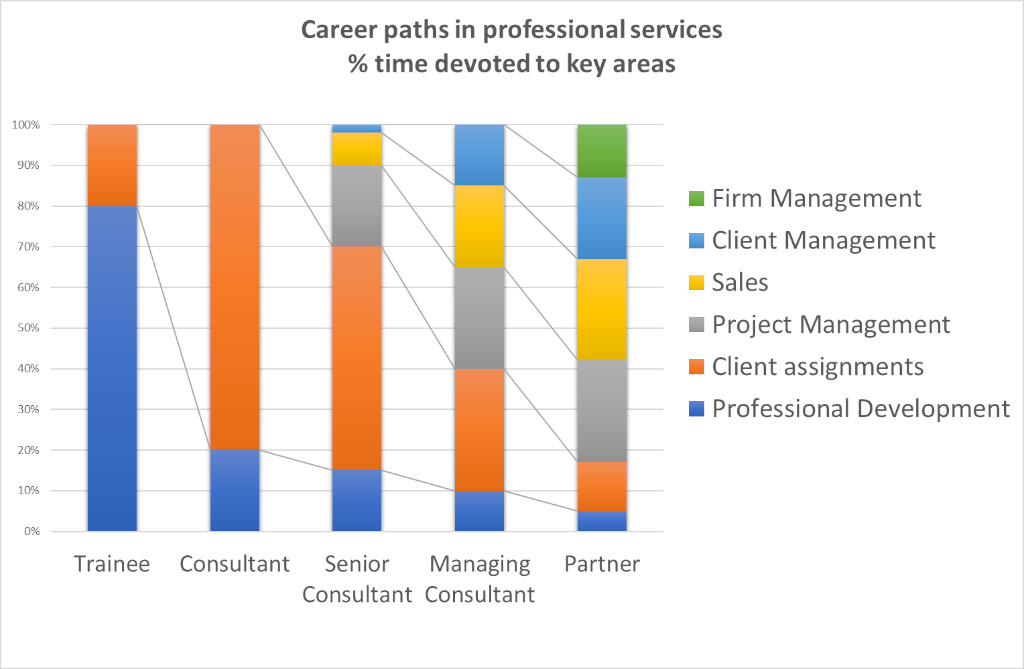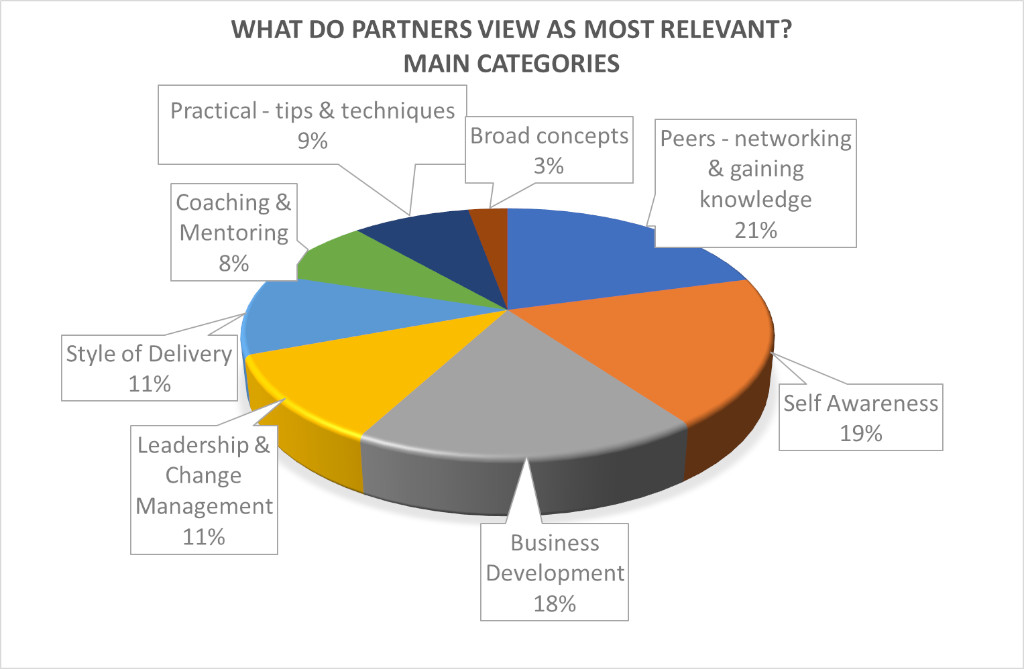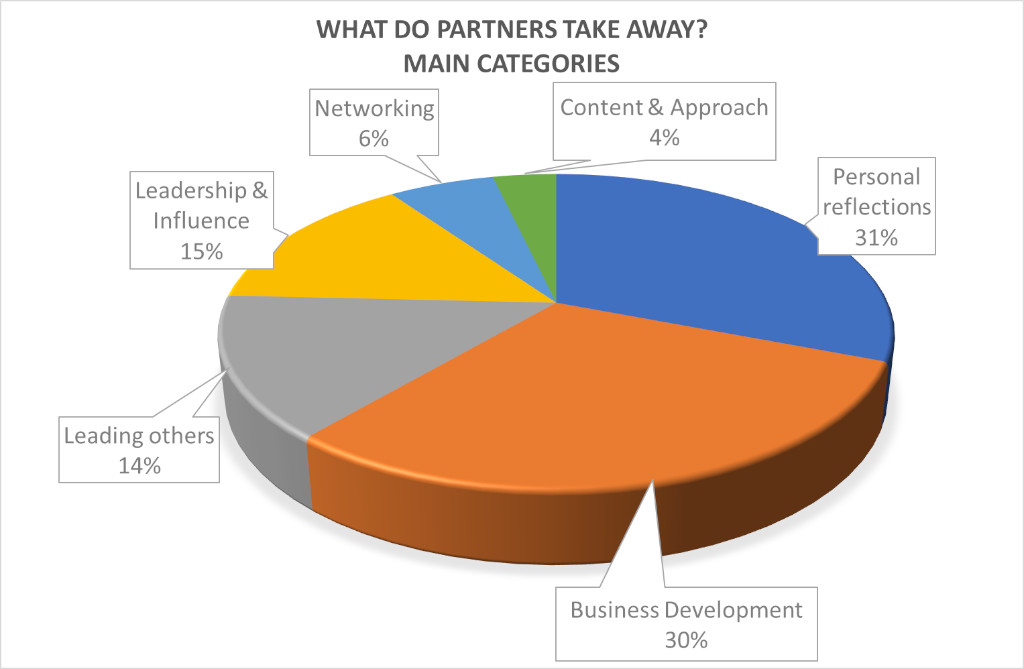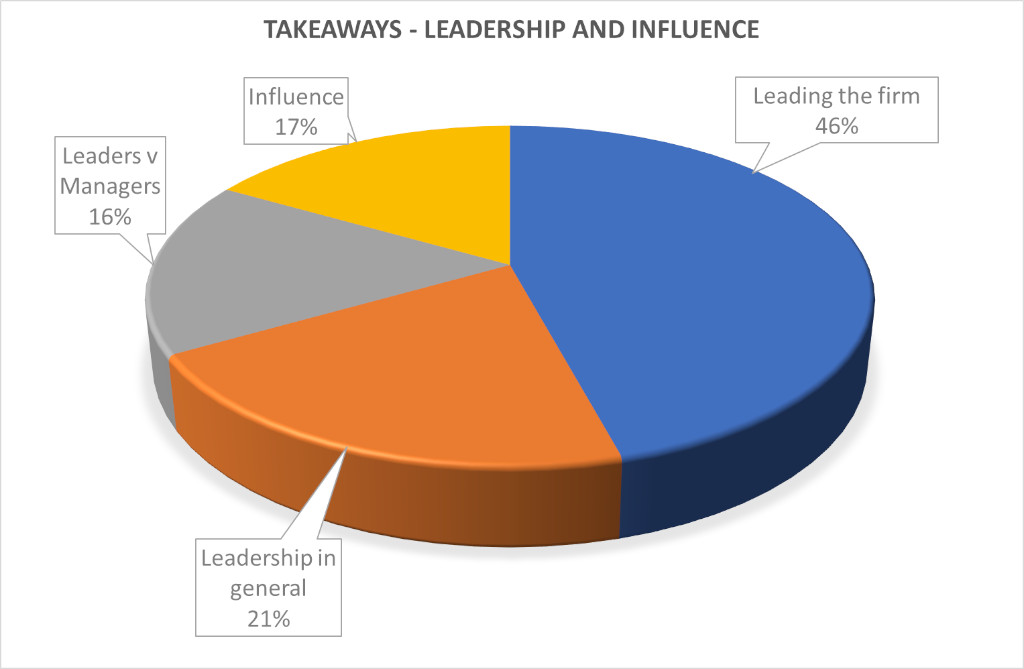
Menu

In 2012 and in the absence of more formal support within this global advisory network, we were asked to put together a programme to help existing Partners develop their leadership strengths for an increasingly uncertain future.
Over the ensuing 7 years we tracked the reactions of over 100 leaders drawn from cities across the globe; here are the results of that survey. These paint an interesting picture of what people found RELEVANT and what were their TAKEAWAYS.
They suggest guidelines worth considering when designing support programmes for senior leadership in professional services. They also reinforce some more general pointers that are summarised at the end of this post.
The figures are based on the number of times a topic was referenced (It was reassuring to find that text-mining software gave the collection of reactions an overall ‘positive’ sentiment!).
The programmes were designed to address what we and our co-developers believed were the critical issues facing partners.
They focused on the non-technical aspects of leadership.
 As a professional’s career progresses, non-technical challenges occupy an increasing proportion of work time. Partners – as senior leaders – must balance keeping abreast of technical developments while also handling major accounts and a portfolio of client projects, bringing in more business, determining strategic direction and attending to the demands of internal firm management. The drive to achieve good returns for time invested – ie increasing revenue and profitability – means newly appointed leaders often find themselves under-prepared across this broader spectrum of responsibilities.
As a professional’s career progresses, non-technical challenges occupy an increasing proportion of work time. Partners – as senior leaders – must balance keeping abreast of technical developments while also handling major accounts and a portfolio of client projects, bringing in more business, determining strategic direction and attending to the demands of internal firm management. The drive to achieve good returns for time invested – ie increasing revenue and profitability – means newly appointed leaders often find themselves under-prepared across this broader spectrum of responsibilities.
In the programme we made time to consider strategic and commercial challenges. We also focused attention on identifying and dealing with leadership demands and looked in depth at two areas – business development (sales) and practical strategies for getting the best from people.
So if Partners in professional services firms are going to take time out to attend a programme, what makes that time relevant?
 Networking. It is a healthy if sobering reality – for anyone charged with commissioning, designing and facilitating such programmes – that participants often place most value on the chance to network and compare notes with peers. Across an inevitably busy programme, enough time needs to be built-in to allow for this.
Networking. It is a healthy if sobering reality – for anyone charged with commissioning, designing and facilitating such programmes – that participants often place most value on the chance to network and compare notes with peers. Across an inevitably busy programme, enough time needs to be built-in to allow for this.
Self awareness. It is clearly important for leaders to take time away from the ‘hamster wheel’. Around half the comments in this category pointed towards the value of honest discussions with colleagues about personal style and approach. This was helped by the judicious use of psychometrics. In addition, 25% of comments referenced the focus on personal resilience, an area that has received increased prominence over recent years.
Business Development. In almost equal measure to Self Awareness, the demand to build more business and ‘increase the size of the pie’ weighs heavily. For this reason, sufficient focus on Business Development was important.
Coaching and mentoring. Leaders’ abilities to actively develop the capability and motivation of their teams, and to address personnel challenges, are essential. The programmes focused on coaching and mentoring strategies as ways to help get the best from others. Admittedly on several occasions we witnessed a lack of clarity over the difference between coaching and mentoring; this is an area that might benefit from further investment, given more time.
Style of delivery. As ever, it is not just what is done but the way it is done. Leaders are sensitive to the way programmes are run. In this case, data suggest that respondents valued the case study approach and the role of study groups in offering opportunities to explore and discuss the reality of working situations.
Practical tips and techniques were favoured over exploring broader concepts.
If this summarises what the leaders saw as relevant, what did they take away?
 Personal reflections. By a whisker, personal reflections topped the takeaways.
Personal reflections. By a whisker, personal reflections topped the takeaways.
It can be lonely at the top, and high achieving leadership in many cases receive far less direct feedback than they would like. 55% of comments referenced personal learning as a significant takeaway. Of these, half placed value on receiving honest feedback from peers. The other half found an appropriate psychometric a useful framework on which to hang thoughts about their own leadership approach.
Business Development. Takeaways about Business Development ran a close second to Personal Reflections. It is worth breaking down the 30% figure.
Just over a third of comments suggested that it had been helpful to stand back and revisit how the sales process works and how to influence it.
Another third was more specific. They liked having techniques for meetings, for building relationships and for handling the ‘sharp end’ ie best practice in structuring actual interactions with potential as well as existing clients.
A significant proportion commented on the impact of several inspirational case studies. Having time to consider and talk through what someone did to turn around an apparently dire situation clearly struck home.
Leading others. When it came to leading others, two thirds of comments referred to the value of practical techniques for coaching and mentoring others.
Leadership and influence. The dominant interest here lay in how best to lead the firm ie strategic leadership as well as operational.
 Two sub-categories stand out: three-quarters referred to actions that help bring about change (75% sub-category comments) and the need to uphold – and pass on – their firm’s ‘partnership values’ (25%).
Two sub-categories stand out: three-quarters referred to actions that help bring about change (75% sub-category comments) and the need to uphold – and pass on – their firm’s ‘partnership values’ (25%).
Of the remaining reactions (see graph), specific comments were made about getting to grips with the difference between Managers versus Leaders and the producer-leader dilemma.
Finally, in the complex matrix that is the professional firm or ‘smart’ organisation, the ability to Influence without direct or formal authority is the name of the game. Strategies, principles and little things – ‘nudges’ – that can be deployed to bring about change all received specific comment.
These programmes addressed leadership in a specific context, the role of Partners in professional services, and the content reflects this.
However, there are some general points that have wider application when designing and running support events for senior leadership: